How Did 'Forrest Gump' Ever Beat Out 'Pulp Fiction' For Best Picture?
How Did ‘Forrest Gump’ Ever Beat Out ‘Pulp Fiction’ For Best Picture?
by Brian Pritchett and Brad Pritchett
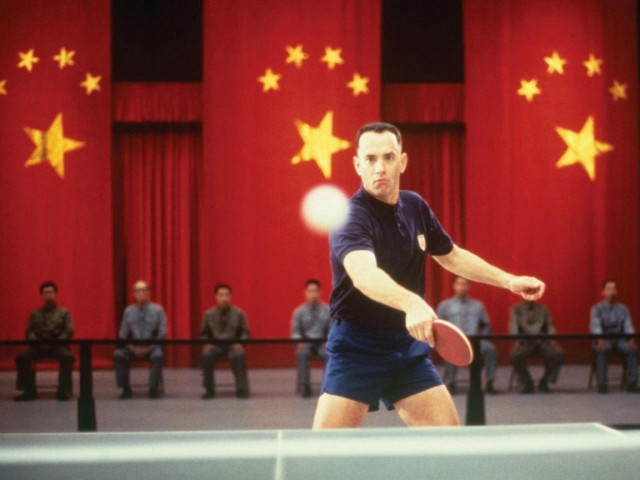
Brian: George C. Scott, loveable old grump that he was, famously called the Oscars “a two-hour meat parade,” as well as “offensive, barbarous and innately corrupt.” It’s hard to argue with any of that, but it makes me nostalgic for the days when the Academy could get it over with in a mere hundred and twenty minutes.
Brad: The Oscars officially died for me in 2002, when Ron Howard somehow won Best Director for A Beautiful Mind over Robert Altman and David Lynch, who were nominated for Gosford Park and Mulholland Drive.
As the Oscars draw near, the second in a series about our strong movie opinions, past and present.
Brian: I think it lost a lot of credibility for both of us in 1995, the year that Letterman hosted, and bombed, and when Robert Zemeckis’ Forrest Gump beat Pulp Fiction for Best Picture. We were college kids and movie dorks back then, all fired up about our opinions, and our reaction to that was equivalent to the nation’s shock and horror at Dave’s “Oprah. Uma. Uma. Oprah” bit. So, we’ve both seen Pulp Fiction fairly recently, but we just watched Forrest Gump for the first time in forever. I still haaaaaated it. Bradley, what were your impressions, and how do they compare to the way you felt in 94?
Brad: I’m probably more forgiving of Gump now, and less of Ron Howard.
Saying a movie is the best picture of the year opens it up to a level of scrutiny that Gump completely withers under. Tom Hanks is always charming, but there are aspects of the movie, beyond its preciousness, that are really bothersome. For one, it seems like the initial concept was probably darker and more of a satire than the non-threatening final product.
Brian: Yeah, I found an interview with Zemeckis and Quentin Tarantino, who are apparently quite chummy, and they both consider Gump a black comedy.
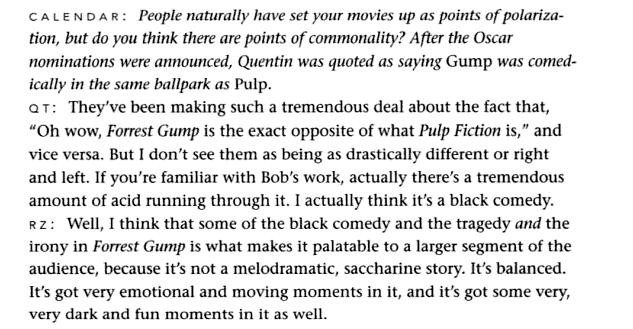
When I watched it, my irony detector never went off once, so if that’s what was intended, it didn’t play that way for me.
Brad: It’s simultaneously too whimsical and self important to play as black comedy. It’s epic Oscar bait. I was never able to see Gump as a character as much as he is a great performance. And that his adventures significantly shape the second half of the 20th century, from inspiring Elvis to swing his hips when he dances, to siccing the cops on the Watergate burglars, inspiring the “Have a nice day” t-shirts and launching the 80’s jogging fad, suggests that Forrest really stops being an individual character and transforms into a dim-witted everyman cipher for the Baby Boomers. In the end, Forrest is a Vietnam vet and small-business owner who’s favored by God presumably because he’s so pure and moral. Over time Forrest comes to embody these fundamentally conservative values, and just post-scripting the film as a ‘black comedy’ is too easy an out after so much sincerity.
Brian: I’ve been Googling around for reviews of Gump, and most of them were great. Ebert loved it, for instance. There was another vein of reaction, though, such as what Pauline Kael said here: “It struck me like Field Of Dreams and other movies that people suckered themselves into reacting to. Somehow there’s a softness in people’s thinking. They’re saying to themselves, You don’t have to be smart, you only have to be good. But you can barely get around the corner on goodness in this society now. These movies do speak to something in the culture, which is a desire to regress, to believe in certain kinds of values that never did operate.” Anthony Lane wasn’t impressed either, and got in some good zingers like: “This movie is so insistently heartwarming that it chilled me to the marrow.” Maybe that kind of disapproval is why the film isn’t talked about much anymore? I mean it’s definitely iconic, with the white suit and the box of chocolates. But I feel like Tarantino’s aesthetic won in the long run.
Brad: Whatever. There’s a restaurant chain based on Forrest Gump.
Brian: Indeed: The Bubba Gump Shrimp Company. There’s one in Times Square. Check out the menu, there’s a dish for every character. Here’s the one for Jenny, Forrest’s long-suffering beatnik love interest:
Veggie Mushroom Burger: Jenny would be proud! A great homemade Mushroom Burger with Pepper Jack Cheese, Red Onions, Avocado, Spring Mix and Remoulade Sauce. Served with Fries.
Anthony Lane wouldn’t be caught dead in this place.
Brad: Tarantino should open a chain of Jack Rabbit Slims. Although a five-dollar shake is pretty standard now, people wouldn’t even get why that’s funny. Besides, Frank Ocean wrote a song about how he totally wants to make out with Forrest Gump. There’s your cultural relevance.
Brian: That song is more interesting than anything on the Forrest Gump soundtrack. How did the heavy rotation of pop hits, like “Hound Dog’” and “California Dreamin” in the movie work for you?
Brad: It’s astonishing how on the nose the soundtrack is at all times. Like, as Jenny is walking out the door, as she’s leaving her abusive boyfriend, there’s Jim Morrison singing, “Don’t you love her as she’s walking out the door.” Or the medley of songs with the word “run” in them as Forrest runs across America: “Running On Empty,” “It Keeps You Runnin’”. Then my favorite bit: Jenny and her wastrel friends are lazing on Hollywood Boulevard, strumming out some Joan Baez or whatever, when a Volkswagen bug pulls up and a random, filthy hippie emerges shouting: HEY, ANYBODY WANT TO GO TO SAN FRANCISCO?
Jenny: (So stoned) I’ll go.
Hippie: FA-A-A-A-R OUT!
(CUE SOUNDTRACK: “If You’re Going to San Francisco”)
Brian: Heh. And those songs aren’t just literal references to what’s happening on screen, they’re also there as broad cultural markers. The Vietnam sequence starts with “Fortunate Son,” of course, because movies about the Vietnam war are legally required to use that song, and five minutes later it’s Hendrix’s cover of “All Along the Watchtower,” and then “There’s something happening here, what it is ain’t exactly clear…” Someone should make a YouTube supercut of every time those songs have been set to footage of jungles and helicopters.
Pulp’s soundtrack has a lot of music from the 60s and 70s too, but not the stuff that we’ve all heard, or at least it wasn’t at the time. Pulp Fiction was my introduction to Al Green, and I bet I’m not the only one. Neil Diamond, Dusty Springfield, Ricky Nelson… all this stuff that was off the cultural radar in the early 90s.
Brad: There was a solid decade where every house party I went to played “Son Of A Preacher Man” at least one time.
Brian: The 60s in Gump hits the whole checklist of clichés: they watch the moon landing on TV, and we hear “That’s one small step for man…” while “Age of Aquarius” is playing at the same time. Later we realize that the 70s have arrived when we see Jenny doing a line, in a disco, and we hear “Get Down Tonight.” There’s a Kool & the Gang song in Pulp Fiction too, but it isn’t one of the two that get played at every wedding.
Brad: This is one of the reasons why I’m still fond of Tarantino’s movie: “Miserlou” was a thirty-year-old entry in the surf rock genre, which had been out of the mainstream for decades, but that music made even just the opening credit sequence of Pulp surprising and fun. After that movie, whole eras of old music opened up to a new audience and classic rock became more than just Lynyrd Skynyrd and The Steve Miller Band. Meanwhile, when Zemeckis goes to find a Bob Dylan song, he just reaches over and grabs “Rainy Day Women #12 & 35,” which is about as exciting as arbitrarily turning on a classic rock radio station.
Brian: Yeah, and Pulp introduced me to new movies I’d never considered before either. There were these little in-jokes and references to Sonny Chiba, Douglas Sirk, the French New Wave, and other things that were hard to find at the neighborhood Blockbuster. And suddenly I wanted to watch all of that. It got me excited about watching movies. Uma orders a Durward Kirby burger at Jack Rabbit Slims. I had never heard of Durward Kirby. I read that the glowing suitcase was an homage to “Kiss Me Deadly”, and the next thing I knew I was browsing the classics aisle.
There are cinematic references in Gump too, like Gary Sinise as the stock troubled Vietnam vet in a wheelchair, who slaps the hood of a New York cab and shouts, “I’m walking here!” while we hear “Everybody’s talkin’ at me…”
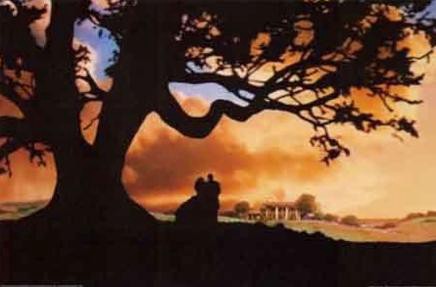
Brad: Yeah, there’s also Forrest and Jen-nay recreating Gone With The Wind’s famous sunset pull back shot and later there’s a flash of the helicopter charge from Apocalypse Now, but it’s all so obvious and clumsily shoe-horned in. I understand how important cultural markers are to Gump, and obviously cinema should be a part of that, but an allusion to something as iconic as Midnight Cowboy should feel more earned, otherwise the moviemakers are just arrogantly stating what section of film history they feel Gump belongs in. They also edit Tom Hanks into Birth of a Nation, which is a damn weird thing to do.
Brian: Speaking of that, let’s talk about how Forrest is named after Nathan Bedford Forrest, who, we understand via the narration, was a Confederate general and a founder of the Ku Klux Klan. Which I guess means that Momma isn’t just a good-hearted source of folksy catchphrases; she’s apparently also into White Power.
Brad: “Momma always said that gypsies are shiftless thieves.” She had so many catchphrases that I might be remembering them wrong.
Brian: I tried to write down everything she says beyond the box of chock-oh-lits bit. There was “Dyin’ is a part of life,” “God is mysterious,” “Miracles happen every day,” and, of course, Momma’s greatest hit, “Stupid is as stupid does.” As long as we’re talking about stupidity, I’m pretty sure that letting your son with special needs join the Army in the lead-up to Vietnam qualifies.
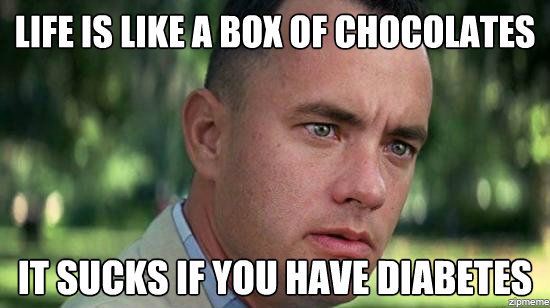
Brad: Yeah, the movie careens along so quickly, the longest scene is probably five minutes or so, that we never really think about why anyone is doing what they’re doing. Other than that Gump loves Jen-nay, and on that point we are pretty clear.
Brian: Tarantino was beset with plagiarism allegations for all his early films. But the things he lifted were from movies I had never heard from. Marcellus memorably threatens Zed with “a pair of pliers and a blowtorch,” which is a line from Charley Varrick, a Don Siegel movie from 1973. I guess deciding whether that constitutes plagiarism or homage is up to the scholars, but what about Gump’s similarity to Woody Allen’s Zelig; have you seen that recently?
Brad: So long ago, but I think it was about a totally passive guy who photobombs major historical events via tricky video editing. So yeah, I don’t see any way to make a connection. Sorry.
Brian: I think Zelig, the character, was crazy, where Gump is merely dumb. But his stupidity is inconsistent, which is one of the main problems with the movie. Forrest is occasionally heroic, in ways that would require a capacity for spatial and situational reasoning, as when he rescues his platoon-mates after an ambush in Vietnam. But there are other points in the movie when his behavior is so amazingly dim that it strains credulity. When George Wallace symbolically blocks the doors to the University of Alabama, Forrest, taking another student’s words literally, believes that raccoons are trying to gain admission to the school. Even worse, on patrol in Vietnam, he seems to think that he and his fellow soldiers are looking for a “guy named Charlie.”
Brad: So many bad jokes. Especially in the CGI sequences where they make human puppets out of dead historical figures, like the one where Forrest inspires John Lennon to write “Imagine” by explaining how horrible commie China is at the time. It just made me cringe.
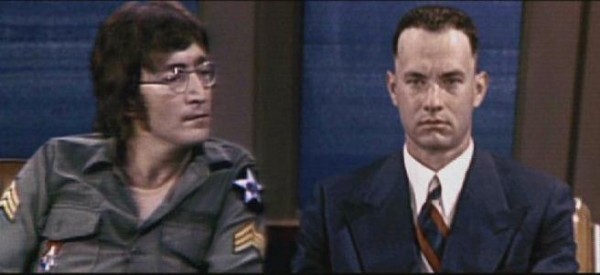
Brian: The jokes all fall flat, for me at least. All those throwaway bits where Forrest accidentally invents pop culture by being a gentle doofus in the right place and the right time. Once he steps in shit, and then says, “It happens,” in the presence of a man who has just introduced himself as a local bumper sticker vendor. Humor is a subjective thing, but objectively speaking, that is not funny. Studies have shown!
Brad: If there’s a central conflict in the film, or at least a singular thing that repeatedly forces Forrest out into the world, it’s Jenny’s stubborn refusal to accept his man-child love.
Brian: Poor Jen-nay. She’s imperiled more often than Spider-man’s girlfriend. All of the things that Forrest is too simple and pure for: sex, drugs, radicalism, jam bands… those are the things that get Jenny into trouble. Forrest only ever has sex once in the film, and that night produces Forrest Gump II. So, very little sex for Forrest, but he does get to be violent fairly often. There are scenes throughout of Forrest going into Hulk mode on anyone who disrespects Jenny, be they school-age bullies, patrons at the strip club where she works, or a college date who gets grabby in a car, while Forrest is creepily stalking Jenny’s dorm in the rain.
Brad: Right, and after Forrest savagely beats that dude, he says the worst thing a man can say about his tendency toward violent sexual jealousy: “I can’t help it. I love you.” Not okay, Forrest Gump. Oh, and he also stomps the most ridiculous character: Wesley, who’s like Rush Limbaugh’s idea of an activist radical what with his stupid epaulets, Trotsky glasses and shit-eating goatee. He’s the white Black Panther who calls Forrest a “baby killer” and then slaps Jen-nay around, launching Forrest into crazed, but arguably more appropriate, psycho violence.
Brian: I didn’t realize that character even had a name. I thought he was just like Beatnik Number Three or something.
Brad: He may as well have been. I’m really not sure if Jenny is even a character or if she could just be renamed Problematic Love Interest One. She’s just another right-wing composite: the liberated woman who is only refusing Forrest because she’s broken and selfish with her childish dreams of being a folk singer, and so, lacking Forrest’s wondrous moral compass, she instead ruins her life with drugs and sex, and then is only redeemed when she becomes a mother.
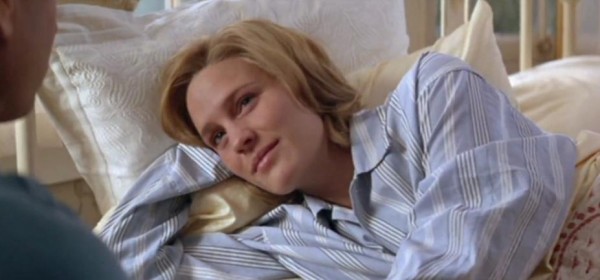
Brian: And at the end, isn’t Jenny just the most beautiful AIDS patient ever? With her makeup and flowing hair on her deathbed? Hanks was in Philadelphia the year before he did Gump, you’d think that he would have suggested some adjustments in lighting or something. You know what, I think I hate this movie more now than I did then. When Rick Santorum called Obama a snob for saying that everyone should go to college, he was thinking of Forrest Gump. When Britney Spears was asked about the war in Iraq and said that we should just trust our president in every decision, that’s a very Gump sentiment.
Brad: Maybe cornpone simplicity was more appealing in the mid-90s, when everyone had good jobs and were so bored that listening to Ace of Base and dry humping your White House intern seemed like good ideas, but idiocy has lost much of its luster in the 21st century. It’s just not a thing I feel comfortable celebrating anymore. Also, Slumdog Millionaire, The Artist, The King’s Speech, Crash, Chicago, A Beautiful Mind, Gladiator, Shakespeare in Love and Titanic have all won the Academy’s award for Best Picture since 1994, and none of them are much better, and some are a hell of a lot worse, than Forrest Gump. And that’s all I have to say about that.
Previously in series: The One Edit That Would Make ‘North By Northwest’ Perfect
Brian Pritchett, of Brooklyn, and Brad Pritchett, of Denver, are brothers.
